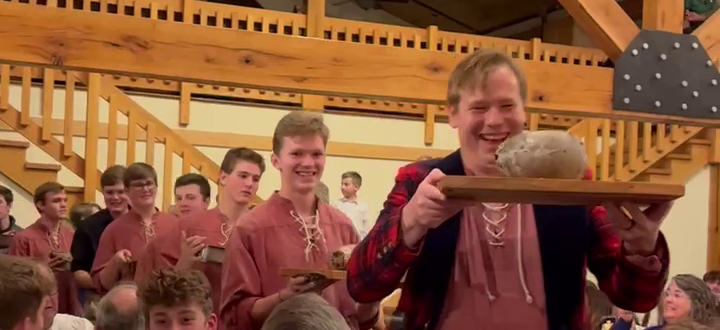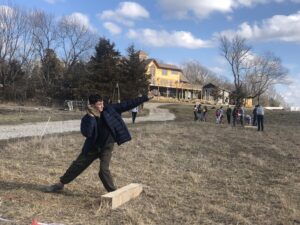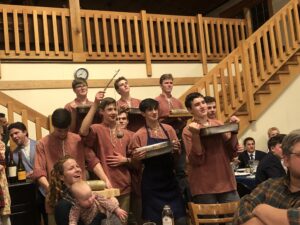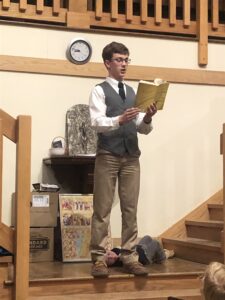By Rosie Klassen, mother to Gabriel Klassen, Jr., Grade 11

Some who are new to St. Martin’s might very well ask the question, “Why have a banquet centered around some old Scottish poet and songwriter rather than a courageous saint or a liturgical feast?” Watching it all happen at St. Martin’s for the second time, our family has been truly impressed with the beauty and meaning of the event. In hearing Burns’ poetry and song, we experienced his genius which plumbs the depths of joy and sorrow and the mystery of being human, and it enriches our lives. I just read recently in a folk song book, “The one who sings goes beyond the ordinary because he desires to express something that cannot otherwise be expressed.” At St. Martin’s, Burns Night takes everyone beyond the ordinary.
This year the first more official Scottish Games were held outside in the sunny and breezy 55 degree afternoon; striking with the wintry trees and farm in the background. Great feats were  done as all the bunk houses listed by their appropriate saint patrons competed. Mr. Slothower’s brother Tim and lovely wife Phebe, who have both competed in the official Highland Games in New York and have won championships there, came with a lot of the gear and taught the lads how to play and compete in several of the games, the last and most challenging being the Caber Toss. This was no ordinary exercise and a couple of the boys were very persistent in trying it-at the risk of life and limb, at least from a mother’s perspective-and in achieving it.
done as all the bunk houses listed by their appropriate saint patrons competed. Mr. Slothower’s brother Tim and lovely wife Phebe, who have both competed in the official Highland Games in New York and have won championships there, came with a lot of the gear and taught the lads how to play and compete in several of the games, the last and most challenging being the Caber Toss. This was no ordinary exercise and a couple of the boys were very persistent in trying it-at the risk of life and limb, at least from a mother’s perspective-and in achieving it.
Each year the tradition continues to grow, as it did with the toasting, the dinner, and the singing. After hors d’oevres, including Mr. Macik’s hand cured lamb prosciutto, the lads accompanied by the families processed down in the dark to the beehives, singing to the bees about the evening feast, and leaving a dish of the delicious dessert as an offering of thanks. Back in the warmth of Theotokos Hall, Fr. Pillari said the opening prayer, along with a poem of Burn’s about the joy of eating, and the dinner was off to a spirited start. The Juniors, servers of the banquet, marched with their homemade Haggis to the triumphant sound of the bagpipes played by Mr. Meyers. Mr. Macik followed with his dramatic and fun “Address to the Haggis,” with sword in hand, bringing to heroic and hilarious heights a humble food of the Scots-the stomach of the sheep.
Mr. Taylor gave a wonderful toast that explained how Burns Supper is an important and fitting festival for St. Martin’s. Accompanied by the little voices of several rosy cheeked babes in arms, he told the story of how the town of Fort Scott was founded by a General Scot from Scotland, a courageous Catholic man, who with other Scots came to America and brought and established their faith in this country. Even the Kerr family has Scottish roots, and so this is a great reason for St. Martin’s to celebrate the debt to its Scottish heritage.
festival for St. Martin’s. Accompanied by the little voices of several rosy cheeked babes in arms, he told the story of how the town of Fort Scott was founded by a General Scot from Scotland, a courageous Catholic man, who with other Scots came to America and brought and established their faith in this country. Even the Kerr family has Scottish roots, and so this is a great reason for St. Martin’s to celebrate the debt to its Scottish heritage.
Throughout the evening, each class of St. Martin’s sang a Burn’s song, and this year in return, family members, faculty, and staff spontaneously rose to the occasion and gifted everyone with their own song offerings. This was such a great development for our school because that is how it happens in traditional cultures where singing is not performance oriented and left to the “professionals,” but is an act of bravery and humility where there is the risk of being seen as a fool yet is a creative act that comes from the heart. There was some foolery and poetry too with the “Toast to the Lassies” and “Toast to the Laddies.” As well as John Paul Dunlap’s reading of P.G. Wodhouse’s thoughts on the origin of Haggis, ending with the saying, “Maybe Burns is just two Irish fellows named Pat and Mike,” at which point all the rest of the boys stormed and swept him off the stairs in a fury. The night ended with the St. Martin boys and everyone who desired to join singing their old favorites with lots of gusto.
is how it happens in traditional cultures where singing is not performance oriented and left to the “professionals,” but is an act of bravery and humility where there is the risk of being seen as a fool yet is a creative act that comes from the heart. There was some foolery and poetry too with the “Toast to the Lassies” and “Toast to the Laddies.” As well as John Paul Dunlap’s reading of P.G. Wodhouse’s thoughts on the origin of Haggis, ending with the saying, “Maybe Burns is just two Irish fellows named Pat and Mike,” at which point all the rest of the boys stormed and swept him off the stairs in a fury. The night ended with the St. Martin boys and everyone who desired to join singing their old favorites with lots of gusto.
All in all, it was a day of physical valiance, when these boys becoming men tested their limits and learned humility in also discovering their strengths in the games and in the preparation of the food. A day where in the gathering together at the table we experienced a holy and familial merriment directed by courtesy, friendship, and gratitude and all knit together by the poetry and song.
Going back the following afternoon to return our son Gabriel, Theotokos was empty of all the sounds and sights of the feast. Just some dirty cleats from that morning’s first rugby game (also bravely done by the lads in frigid 20 degree weather) lay thrown in a heap of mud in the corner. Even this silence was beautiful because in it I could still hear all the voices raised, the light of the hearth in the hall, the dark evening without, as our song drowned out the babbling voice of the Enemy who declared in The Screwtape Letters, “How I hate silence and music!” So we should take to heart year round what Robert Burns understood and what St. Augustine teaches: “Sing, but keep on singing, because song is a thing of joy; more profoundly, it is a thing of love.”

